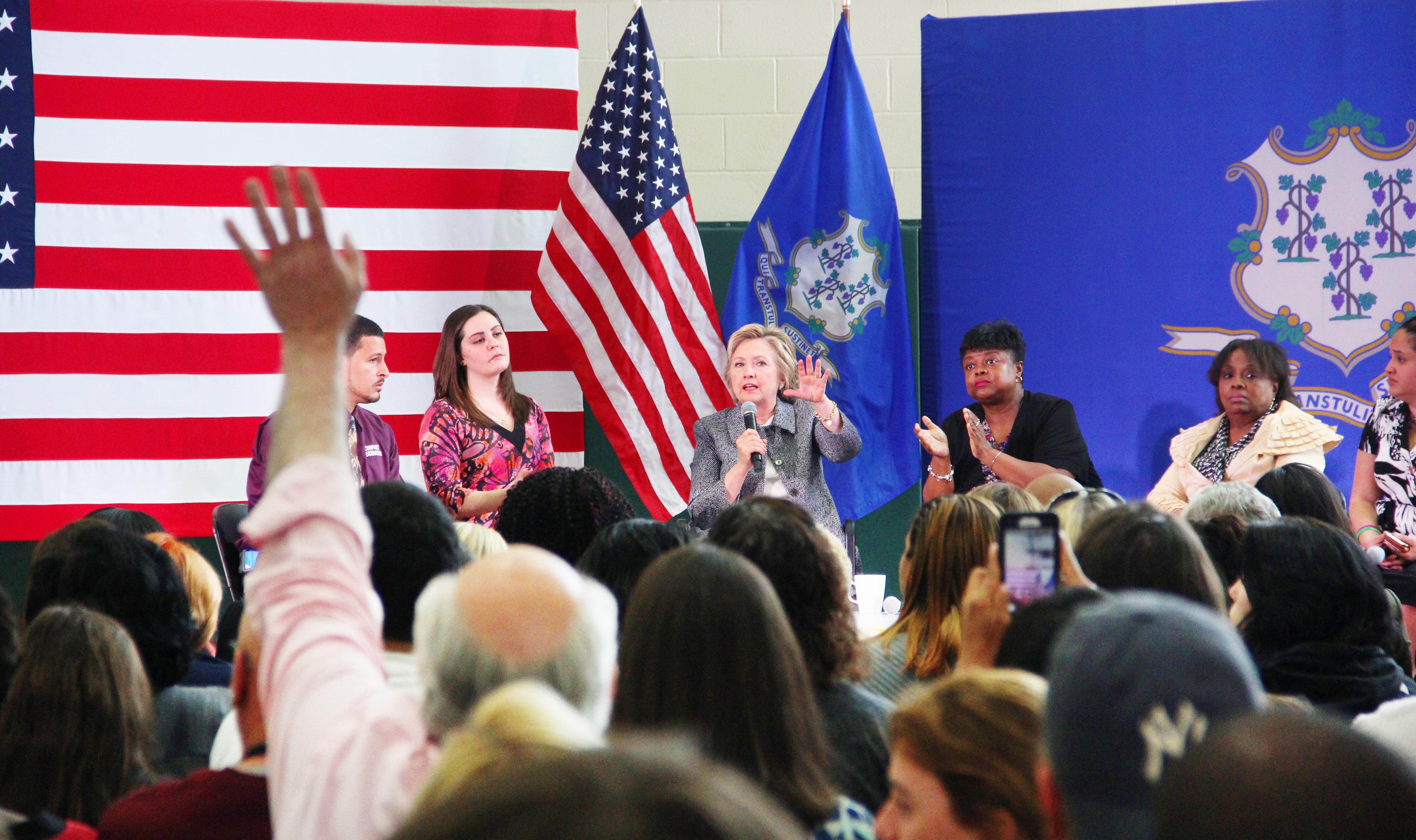
Just days before the state’s primary on Tuesday, the Clinton campaign came to Connecticut, with Democratic presidential candidate Hillary Clinton LAW ’73 speaking at a discussion on gun control in Hartford while her husband, former president Bill Clinton LAW ’73 visited the Elm City.
Hillary Clinton bridged the gap of generations at her Thursday morning event, drawing a crowd of students and policymakers alike to a roundtable on gun control that featured five panelists who have been personally affected by gun violence. Clinton, who was welcomed on stage by a crowd of more than 300 people chanting her name, dedicated the event to criticizing rampant gun violence and calling for tighter gun-control policies. She and the other panelists addressed the disastrous impact of gun availability on youth culture in Connecticut, a state which has been permeated by gang activity and marred by some of the nation’s most devastating acts of gun violence. Gov. Dannel Malloy and Hartford Mayor Luke Bronin ’01 LAW ’06, both present at the discussion, reaffirmed their endorsements of Clinton.
“I want to be the president for the struggling and the striving,” Clinton said. “I find it absolutely indefensible — the arguments made by people who will not accept responsibility for what is going on in this country.”
She lauded Connecticut’s effort in pushing for stricter gun control policies under Malloy’s leadership. During his tenure as governor, Malloy has advocated for increased gun control legislation in the state, passing an array of some of the nation’s toughest laws following the 2012 shooting at Sandy Hook Elementary School.
Clinton attributed the stagnancy of gun control reform to the strength of the gun lobby, which she called the most powerful lobby in Washington, D.C.
“They have figured out a way to intimidate elected officials at all levels, who just stop thinking about this issue because they are too scared to stand up to the [National Rifle Association],” Clinton stated.
The panelists represented a broad swath of community members: some who lost close family members in the Sandy Hook shooting, some who broke free from the cycle of poverty and used their experience to forge a path for other disadvantaged youths and some who bore witness to and have decided to fight against the atrocities of gun violence.
Among the five panelists was Erica Smegielski, who lost her mother — Sandy Hook Elementary School Principal Dawn Hochsprung — in the Newtown shooting. Smegielski admitted that prior to the tragedy, gun violence and gun-related crimes were not “on [her] radar” aside from watching the news. She said she began advocating for common-sense gun laws shortly after recovering from the death of her mother.
“There is nothing I can do to bring [my mother] back,” Smegielski said. “What I can do is stand up and use my voice and story to motivate other people to use their voice and share their stories and come together on this issue.”
Fellow panelist Iran Nazario, program director of Peacebuilders — an organization that provides youth with psychological first aid, crisis intervention and grief counseling — personified the cultural implication of normalizing gun violence. He spoke of his first experience with a gun as a 9-year-old watching a police officer point a gun at his mother as she was being arrested for a drug offense. Nazario subsequently became a child of “the system” — a foster child thrust into a cycle of imprisonment and homelessness.
“I became a statistic,” Nazario said.
Clinton said she hopes to initiate programs that act as a positive replacement for gangs, in order to “protect, support and guide” students. She added that she believes when young people like Nazario wish to turn their lives around, they should be supplied with sources to support their “constant and continuous learning.” Clinton iterated the inequality that exists in many aspects of American society, including the uneven distribution of educational resources.
Kim Washington, founder of New Haven Moms Demand Action — a nonprofit that provides encouragement to families affected by gun-related crimes in the New Haven and Hamden areas — also emphasized the need for communities to act together against gun violence.
At the roundtable, Hartford community members Nancy Kirchmyer and Judy Carrithers expressed their dedication to Clinton for her resolve to institute more austere gun control measures. Carrithers said Clinton’s dedication to implementing these regulations could make the election a “one-issue vote” for her.
The roundtable also attracted a considerable number of college students.
“She has a lot of youth support — we’re just not the loudest people in the room,” Wesleyan freshman Henry Miller said.
While Clinton addressed the crowd in Hartford, her campaign effort in New Haven took on a lighter tone. In the late afternoon, Bill Clinton stopped outside Varick Memorial AME Zion Church, an evangelist church in Dixwell — a predominantly black neighborhood to the north of Yale’s campus — where he briefly met with the church’s Rev. Eldren Morrison, who oversees the church’s congregation of 1,100. He later drove to Wooster Square to grab a slice of pizza at the city’s famous Frank Pepe Pizzeria Napoletana.
Finnegan Schick contributed reporting.







